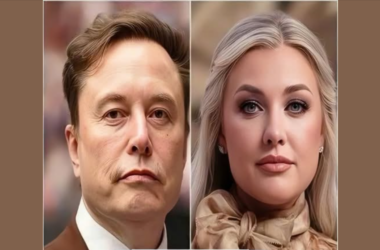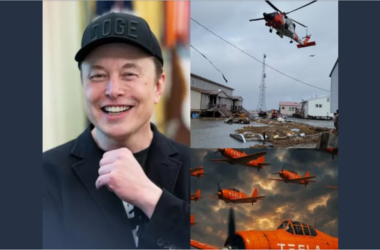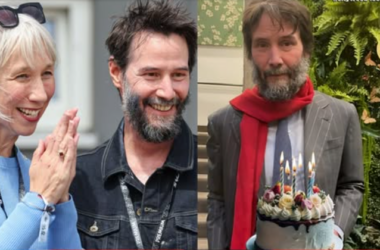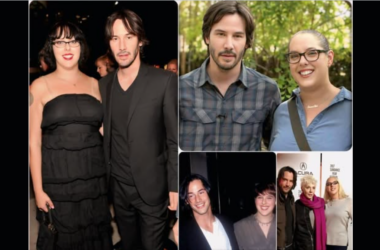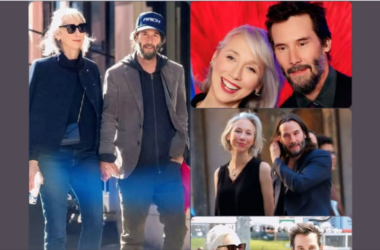
It was a Tuesday morning painted in the soft gold of an Austin sunrise when I witnessed something that would change the way I saw both Elon Musk and the quiet, unstoppable force of kindness.
I’d come to Musk’s neighborhood that morning, not as a journalist, but as a visiting friend to one of his neighbors—a retired schoolteacher who often regaled me with tales of the eccentric billionaire next door and his incessant, joyful golden retriever named Marley. By coincidence, I would become a first-hand witness as this quiet suburb found itself at the heart of an extraordinary story of loss, hope, and discovery.

Elon Musk, that titan of industry and stars, began his day not with meetings or blueprints, but with absence. He called for Marley—once, twice, then desperately—but the usual gallop of paws and the eager jingle of tags never answered. When I stepped outside into the morning air, I saw him standing by the open gate—barefoot, wild-eyed, the image of a man stripped of all defenses.
“Have you seen a golden retriever?” he asked, voice barely above a whisper. I shook my head, and for the first time, Elon Musk looked ordinary—just another lonely soul searching for a friend.
The hours ticked by. The word spread, first in a flurry of phone calls to neighbors, then across Austin through Tesla employees and then, inevitably, to Twitter, where the world watched Musk’s heartbreak with a mix of sympathy and fascination.
Yet, no amount of social media shares could offer comfort, nor did they bring Marley home.
By noon, Musk had combed every street within miles, spoken to strangers, pleaded at animal shelters. His phone, always the epicenter of a billion-dollar orbit, now became a lifeline for hope—waiting, praying for a single call that would end this nightmare.
The first real clue came, not from technology, but from humanity—a nurse named Sarah Chun from Austin Children’s Hospital. She asked Musk to come, to bring tissues, and to brace himself for something he “couldn’t understand over the phone.”
I followed, clutching my notebook, more as a talisman than for work.
The hospital’s pediatric ward was a swirl of innocent chaos—artwork on the walls, cartoon animals on ceiling tiles, and the underlying hum of worry from parents pacing the halls.
Musk was led to a small room with the number 314. Through the window, a pale eight-year-old boy lay in bed, drawing rockets, his tiny fingers cradling colored pencils with a focus I’ve only seen in people twice his age. And on a blanket beside him, tail wagging, lay Marley.
I didn’t see Musk cry—at least, not outwardly—but his breath hitched when Marley leapt into his arms. In that moment, something unspoken passed between man and dog, the kind of reunion that erases hardship and fear.

Sarah explained: The boy, Xander, had seen Marley wandering, scared and confused, near the busy main road. Even though Xander could barely walk and was tethered to machines pumping life into his failing heart, he begged his mother to stop the car. Realizing Marley wouldn’t come to a stranger, Xander drew a crude but loving rocket ship—remembering from his rides past Musk’s house that Marley adored rocket-shaped toys.
The drawing worked. Marley, sensing a friend, approached. With no choice—her son’s own heart appointment minutes away—Xander’s mother bundled Marley into their car and brought him to the hospital, promising to find his owner after Xander’s treatment.
But then something magical happened. Marley, calmer than he’d ever been, laid his head on Xander’s chest as the doctors ran tests and the boy trembled. For two days, Musk’s dog refused to leave Xander’s side. The nurses watched in awe as the sick child finally slept without nightmares and ate without protest, comforted by Marley’s gentle presence.
For Musk, the decision was agonizing: take home his beloved dog, or let Marley stay with a boy who seemed to need him even more.
As the hours passed in room 314, something remarkable unfolded. I watched as Musk and Xander spoke about rockets, hope, and impossible dreams. Xander showed Musk his sketches—rockets with wheelchair ramps, Mars colonies where no one was left behind. All borne of his own longing for a world where he could run, play, and chase dreams, unencumbered by illness.
Musk listened—not as a famous innovator, but as a man struck by the courage of a child. When Xander, shyly, asked if Marley could stay “just a bit longer,” Musk agreed, voice thick with emotion. Days turned into weeks, as Marley became both therapy dog and best friend—not only to Xander, but to every sick child on the ward.
During those days I spent in the hospital, quietly observing, I saw Musk’s priorities transform. Meetings were canceled. Engineers, inspired by Xander’s drawings, began to discuss accessibility—what good was building a city on Mars if not everyone could be part of it? Musk arranged for Xander to consult on real SpaceX designs, proving that invention isn’t just for the healthy or able; it is the birthright of every dreamer.
And then, the miracle: a matching heart was found. The suspense of transplant surgery was the longest night of waiting any of us had ever known. I watched as Musk comforted Xander’s mother, as Marley slept on the boy’s bed, refusing food, keeping vigil.
When, at dawn, Xander opened his eyes, stronger than before, the entire hospital erupted in tears and laughter. Marley, Musk, and a teary-eyed medical team became the boy’s first family beyond blood.
Months have passed now. Marley visits the hospital as an official therapy dog, led by Xander, now a healthy nine-year-old sidekick. SpaceX’s engineers continue receiving his sketches, and the first detailed plans for Mars hospitals proudly bear the name “Project Xander.”
In losing his dog, Elon Musk found something he hadn’t realized he was seeking—the reminder that the most important discoveries aren’t always made in laboratories or rocket ships, but in the quiet moments when hope is shared, and hearts are mended together.
And me? I was there. I saw the day when a lost dog, a lonely mogul, and a sick child taught a hospital—and then the world—that the best kind of missions always begin and end at home.
